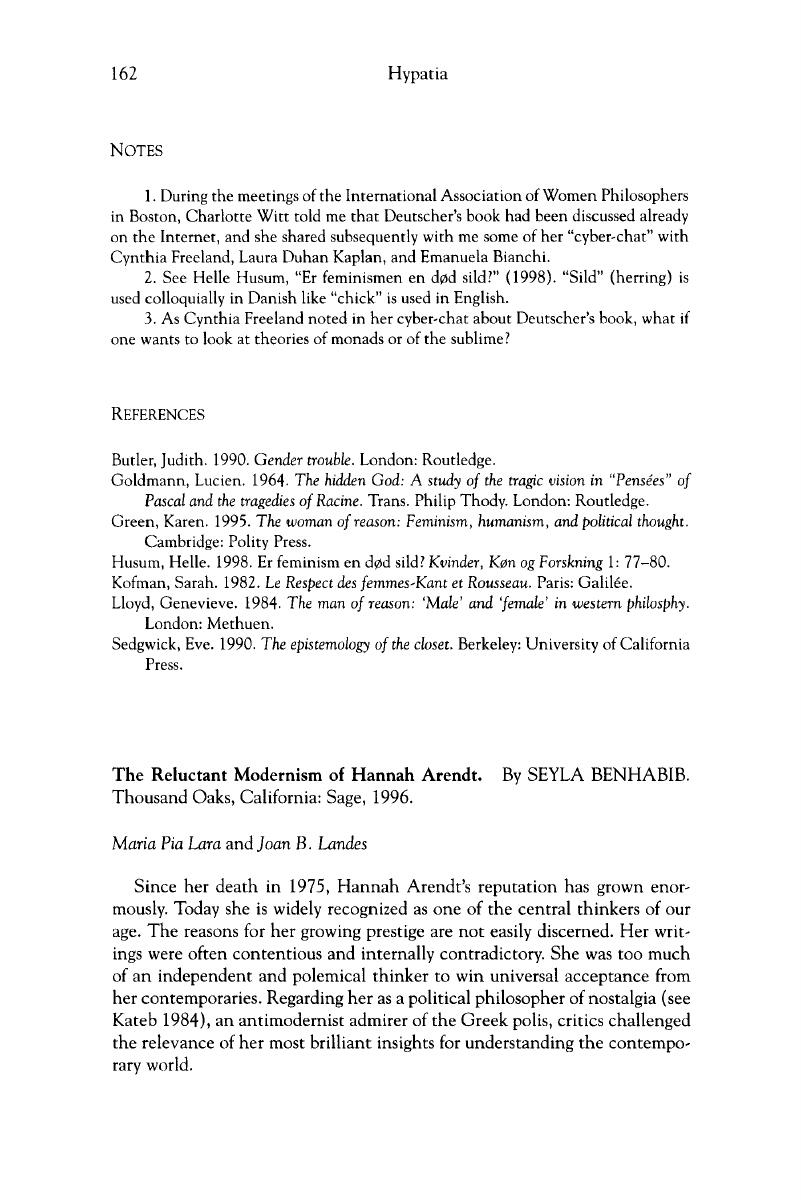No CrossRef data available.
Article contents
The Reluctant Modernism of Hannah Arendt. By Seyla Benhabib. Thousand Oaks, California: Sage, 1996.
Published online by Cambridge University Press: 25 March 2020
Abstract
An abstract is not available for this content so a preview has been provided. Please use the Get access link above for information on how to access this content.

- Type
- Book Reviews
- Information
- Copyright
- Copyright © 1999 by Hypatia, Inc.
References
Arendt, Hannah. 1979. The origins of totalitarianism. New York: Harcourt Brace Jovanovich. (Originally published as The burden of our time. London: Seeker and Warburg, 1951.).Google Scholar
Arendt, Hannah. 1997. Rafiel Varnhagen: The life of a Jewish woman. Trans. Winston, Richard and Winston, Clara and ed. Weissberg, Liliane. Baltimore: Johns Hopkins University Press.Google Scholar
Dietz, Mary G. 1995. Feminist receptions of Hannah Arendt. In Feminist interpretations of Hannah Arendt, ed. Honig, Bonnie. University Park: Pennsylvania State University Press.Google Scholar
Disch, Lisa. 1993. More truth than fact: Storytelling as critical understanding in the writings of Hannah Arendt. Political Theory 21(4): 665–94.CrossRefGoogle Scholar
Disch, Lisa Jane. 1994. Hannah Arendt and the limits of philosophy. Ithaca: Cornell University Press.Google Scholar
Ettinger, Elzbieta. 1995. Hannah Arendt/Martin Heidegger. New Haven: Yale University Press.Google Scholar
Habermas, Jürgen. 1984. The theory of communicative action. Vol. 1, Reason and the rationalization of society. Trans. McCarthy, Thomas. Boston: Beacon Press.Google Scholar
Habermas, Jürgen. 1987. The theory of communicative action. Vol. 2, Lifeworld and system: A critique of functionalist reason. Trans. McCarthy, Thomas. Boston: Beacon Press.Google Scholar
Habermas, Jürgen. 1996. Between facts and norms: Contributions to a discourse theory of law and democracy. Trans. Rehg, William. Cambridge: The MIT Press.CrossRefGoogle Scholar
Hill, Melvyn A. ed., 1979. Hannah Arendt: The recovery of the public world. New York: St. Martin's.Google Scholar
Honig, Bonnie ed., 1995a. Feminist interpretations of Hannah Arendt. University Park: Pennsylvania State University Press.Google Scholar
Honig, Bonnie ed., 1995b. Toward an agonistic feminism: Hannah Arendt and the politics of identity. In Feminist interpretations of Hannah Arendt, ed. Honig, Bonnie. University Park: Pennsylvania State University Press.Google Scholar
Kateb, George. 1984. Hannah Arendt: Politics, conscience, evil. Totowa, NJ: Rowman and Allanheld.Google Scholar
Lara, Maria Pia. 1998. Moral textures: Feminist narratives in the public sphere. Cambridge, England: Polity.Google Scholar
Pitkin, Hanna Fenichel. 1998. The attack of the blob: Hannah Arendt's concept of the social. Chicago: The University of Chicago Press.Google Scholar
Rich, Adrienne. 1979. On lies, secrets and silence: Selected prose 1966–1978. New York: Norton.Google Scholar
Villa, Dana R. 1997. Hannah Arendt: Modernity, alienation, and critique. In Hannah Arendt and the meaning of politics, ed. Calhoun, Craig and McGowan, John. Minneapolis: University of Minnesota Press.Google Scholar
Young‐Bruehl, Elizabeth. 1976. Hannah Arendt: For love of the world. New Haven: Yale University Press.Google Scholar


